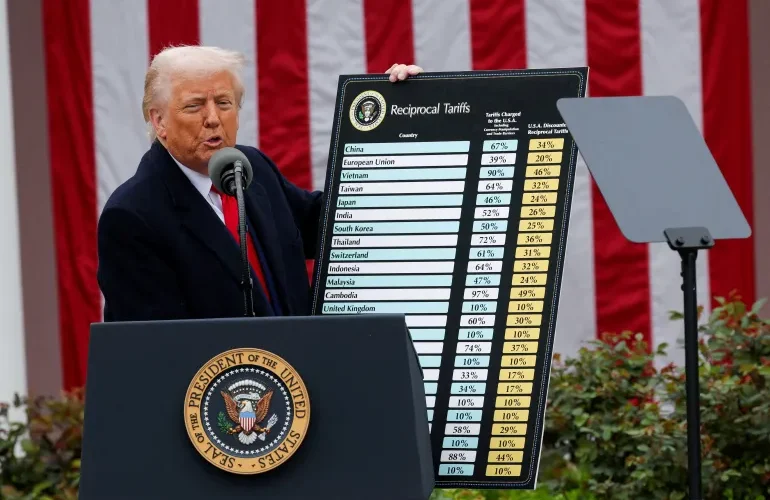By our reporter, and agency reports
More than 50 countries have directly contacted the White House to initiate trade talks following United States (US) President Donald Trump’s imposition of wide-ranging punitive tariffs, administration officials have said.
The tariffs, which caused a nearly $6 trillion drop in US stock values last week and battered global markets, have drawn worldwide attention and sparked fears of a potential economic downturn.
But the Trump administration has downplayed that and potential further catastrophic economic fallout.
In Nigeria, the Federal Government (FG) confessed that the tariffs could adversely impact the country’s about $6 billion exports with the US and hurt the competitiveness of certain non-oil core areas such as agro-processed exports and others which were previously exempt under the US African Growth and Opportunity Act (AGOA).
Trade, Industry and Investment Minister, Jumoke Oduwole took the position in a press statement she issued on Sunday, April 6.
Though she listed economic diplomacy to secure favourable terms for the country as one of the government’s many options to overcome the tariff consequences and build a resilient economy, the Minister did not categorically say if such diplomatic window would be opened with the US, amid imminent trade talks being initiated by other countries with the superpower.
In the meantime, investors nervously awaited the open of US trading after Wall Street’s selloff last week, anticipating another week of turbulence as other nations react. Asian markets will open in the coming hours and expect a rocky day.
In a series of Sunday-morning talk show interviews, Trump’s top economic advisers defended the tariffs, describing them as a strategic move to strengthen the US position in global trade.
Treasury Secretary Scott Bessent revealed that more than 50 nations had begun negotiations with the US since the tariffs were announced on Wednesday, but did not disclose the countries involved.
Bessent claimed the tariffs gave Trump “maximum leverage,” though their impact on the US economy remains uncertain. He dismissed concerns about a recession, citing unexpectedly strong job growth in the US.
Trump’s wide-ranging tariffs came into effect on Saturday.
The initial 10 percent “baseline” tariff took effect at US seaports, airports and customs warehouses, ushering in Trump’s full rejection of the post-World War II system of mutually agreed tariff rates.
A decline in US GDP
Despite this, economists have warned that the tariffs could lead to a decline in US Gross Domestic Product (GDP), with JPMorgan economists revising their growth forecast from a 1.3 percent increase to a 0.3 percent decrease.
The tariffs, aimed at pressuring foreign governments to make concessions, have also triggered retaliatory levies, including hefty ones from China, raising fears of a global trade war.
US allies like Taiwan, Israel, India, and Italy have already expressed interest in negotiating with the US to avoid the tariffs.
Taiwanese leader Lai Ching-te offered zero tariffs as the basis for talks, while Israeli Prime Minister Benjamin Netanyahu sought relief from the 17 percent tariff on Israeli goods.
Nonetheless, the US continued to implement tariffs, with higher “reciprocal” duties expected to take effect on Wednesday.
Critics have raised concerns over the method used to determine the tariffs, especially after they were applied to some remote, uninhabited territories.
Commerce Secretary Howard Lutnick defended the strategy, claiming that it aimed to prevent countries from circumventing the tariffs with loopholes.
Reacting to the tariff imposition, the Nigerian Government acknowledged that the 14% tariff on Nigerian exports by the US could hurt the country even as the President Bola Tinubu administration seeks to make the best out of the challenge.
Trump had imposed the tariff against Nigeria, citing what he described as the country’s trade surplus.
However, the statement signed and released by Minister Oduwole noted that while oil has long dominated Nigeria’s exports to the US, non-oil products, many previously exempt under the African Growth and Opportunity Act (AGOA), now face potential dislocations.
The Minister expressed Nigeria’s commitment to mitigating the impact while accelerating economic diversification, adding that the new 10% tariff on key categories could hit the competitiveness of Nigerian goods in the US.
Oduwole stated: “For businesses in the non-oil sector, these measures present destabilizing challenges to price competitiveness and market access, especially in emerging and value-added sectors vital to our diversification agenda.
“SMEs building their business models around AGOA exemptions will face the pressures of rising costs and uncertain buyer commitments.”
The statement also noted that Nigeria’s annual exports to the US have averaged between $5 billion and $6 billion over the last two years, with crude oil and mineral fuels accounting for more than 90% of the total.
According to the Minister, non-oil exports, including fertilizers, urea, lead, and agricultural products, account for under 5% of total shipments.
“We are approaching this moment with pragmatism and purpose—turning global trade challenges into opportunities to grow our non-oil export footprint and build a more resilient economy,” she said.
Oduwole added that the Tinubu administration has rolled out policy, financing, and infrastructure measures to help Nigerian businesses adapt, listing these to include expanding alternative export markets outside the US, enhancing quality control and traceability for Nigerian goods, and strengthening trade diplomacy to secure favourable terms.
*Published by aljazeera.com on April 6, with local content tweaks injected by our editorial team.


















